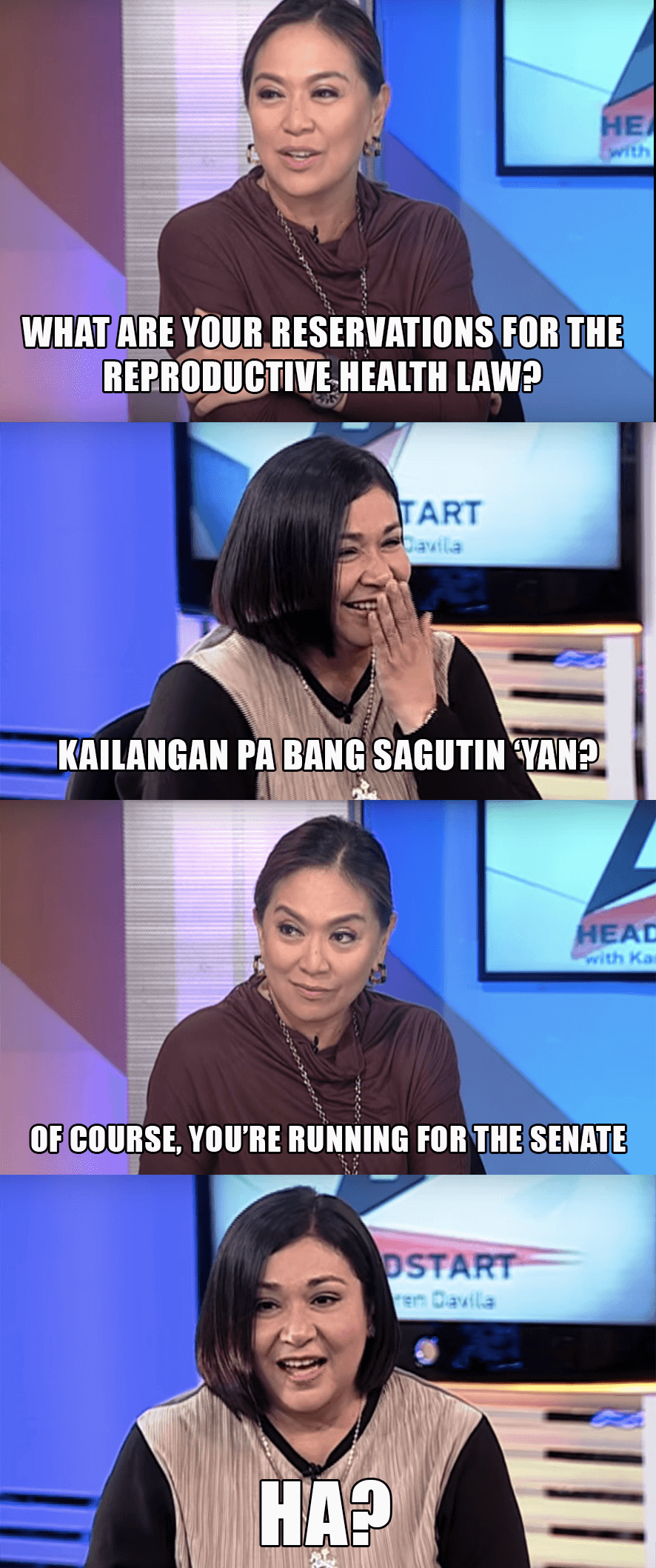Don’t Be An Alma Moreno In Your Next Job Interview

When When In Manila posted the video of Karen Davila interviewing Alma Moreno on Headstart, the Philippines wildly reacted to how badly Moreno handled the interview. The backlash, the memes, and the jokes are somehow well-deserved. But for jobseekers, instead of focusing on reacting to the video, the “awkward” interview should be an opportunity to learn what you shouldn’t do during an interview. While an interview on national TV about one’s decision to run for the Senate is very different from a private interview in an office, they are at their core the same thing: the interview is a way for recruiters — in Alma’s case, the voters — to find out whether or not you’re a worthy and able candidate. Here are three of Alma Moreno’s major interview mistakes that you should never commit:
TOPICS
Not Doing Your Homework

Alma Moreno didn’t seem to know how to answer Karen Davila’s questions on policy issues, despite Moreno touting her nine years in “legislative.” The highlight of her failed interview was when she begins to stammer and even lose composure when Davila was grilling Moreno on her views on the RH Bill. Even worse, when Davila asked Moreno about her “reservations” about the RH Bill, all Moreno could blurt out during a fit of nervous laughter was “Kailangan pa bang sagutin ‘yan?” (Do I really need to answer that?). Davila curtly replied, “Of course. You’re running for the Senate.” It’s as if Moreno did not know what it took to be a Senator (and it seems like she really doesn’t).

The same pattern of insubstantial responses abounds during the whole program, especially when Davila asks Moreno about her views on issues relevant to her prospective job in the Senate. And in the end, even if it was simply because she just isn’t good at articulating her thoughts, she just looks flat out unprepared. Before going to a job interview, it’s important to do your homework and prepare well for the grilling you’re expected to go through. If you’re applying to be a Marketing Associate for Company X, for example, research on what marketing people do. Update yourself on current best practice for the industry. Find out what Company X does and what they want to accomplish. If you don’t know what you’re going to be doing and what you’re getting into, why even bother looking for the right job for you? Being prepared also involves practicing your responses to difficult questions you expect to come up during the interview. Even practicing your responses to the common questions will help boost your confidence immensely. Knowing is half the battle, as the saying goes, and in Moreno’s case, not bothering about that half led to disastrous results.
Answering Questions Without Thinking
Of course, no matter how prepared you are, you can and probably will run into a question that will stump you. It can be about facts and figures about the industry that are hard to explain on demand. It can be about a new trend that your interviewer is very keen on but you weren’t able to learn about it. In fact, it can be as common a question like, “What’s your greatest weakness?” or “Why should we hire you?” In these cases, what you should always remember is to give a well thought-out answer. If you need a bit of time to think about your answer, ask your interviewer for it. Give yourself a few seconds to collect your thoughts and don’t impulsively throw out words that may mean the end of the line for your application. Unfortunately for Moreno, she gave in to these impulsive instincts, and her being unprepared made everything worse. When she heard Davila say “anti-discrimination,” she re-exclaimed the word “discrimination” and tried to capitalize on it without giving a proper answer as to why she’s against same-sex marriage but (kind of) supports the anti-discrimination policy. She also did the same when she blurted out “control” and the all-too-famous “PILLS!”

And in all this, Moreno fails to elaborate well on any of her views, leaving the audience to wonder: What does she really mean? What does she want to say? Most of all, what exactly are her “reservations” on the RH Bill (which she never mentions at all)? This is not what you want the voters to think. As for you, this is not what you want your interviewer to think. Good interviewers and recruiters will know if you’re faking it, or if you’re just trying to lengthen your answers to look smart. Davila did, and interview novice Moreno got a ruthless interrogation from the experienced journalist.
Not Respecting The Interviewer’s Time And Effort
Go back to the video (which we conveniently put below this paragraph). Start watching the video at 9:43, where Karen Davila asks Alma Moreno on what the latter’s advocacy will be if she gets elected into Senate. By this point, Moreno had been stumbling on her words in responding to Davila, and Davila seems to be getting impatient with Moreno’s beating around the bush.
Davila then insistently presses the other woman to elaborate on her points, only to have Moreno saying “Teka muna! Sandali!” (Wait! Hold on!) At this point, Davila seems to be disappointed and exasperated, as you have probably already seen, and how the rest of the interview went is Philippine Internet history. Imagine being interviewed on national TV only to have the interviewer educate you on things that you should already know about. This is exactly what happened when Davila was recounting the series of events behind the RH Bill, for the benefit of Moreno, and, most embarrassing of all, when Davila elaborately tried to explain what “having reservations” means to Moreno, who never supplied a satisfactory answer even until the end of the video.

Now imagine yourself in that position, being educated by your interviewer on the very subject that you’re supposed to be knowledgeable about. (Isn’t that why you’re applying for the job in the first place?) If your interviewer becomes frustrated at your responses, you’ll be leaving the impression that you not only entered the room unprepared, but that you also didn’t take the interview and the job seriously enough to prepare for a serious recruitment process. Remember that your interviewer is human, and no matter how objective they try to be, there will be things that will bother them and change the way they think about you as an applicant. Failing to give straightforward and valuable answers to their questions; constantly stuttering and stammering out of nervousness or uncertainty; trying to fake your way through an interview — these little things can make or break your chances of even being considered for a follow-up interview.






No comment available yet!